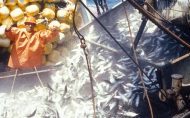Fisheries
Economics of rebuilding fisheries
|
|
Many commercial fisheries are characterised by too many fishers (and vessels) chasing too few fish. |
According to FAO data from 2007, 17% of the world’s fish stocks are overexploited, 7% are depleted, and 1% are recovering from depletion. The collapse of several high profile fish stocks, such as the North West Atlantic cod, and their failure to recover despite a reduction or moratorium on fishing effort, has raised concerns over the success of rebuilding plans for overfished stocks.
OECD work on the economics of rebuilding fisheries provides policy makers with guidance on the design and implementation of fisheries rebuilding programs, focusing on the economic and institutional issues surrounding rebuilding efforts.
Video
|
Elinor Ostrom on managing common pool resources |
|
|
Fisheries: preserving stocks, keeping jobs |
Further reading
- Rebuilding Fisheries: The Way Forward
This report investigates the potential for improvement and finds that aquaculture licensing and regulation can slightly affect growth rates in OECD countries, and there are opportunities and benefits to reducing the administrative burden faced by enterprises. - Fisheries Policy Reform: National Experiences
Fisheries reform is triggered by economic crisis, not environmental crisis. More focus on the economic consequences of fisheries policy and management will enable decision makers to undertake timely reform when needed.
Using political economy analysis of fisheries in Iceland, Korea, Mexico, Norway and New Zealand, this book illustrates the factors that facilitate reform and the difficulties that countries face in the reform process. - The Economic Value of Rebuilding Fisheries
What is the value of recovering a fishery from a collapsed state? The results of this study suggest that the value can be quite large (perhaps 2-5 fold increases or greater in the value of a collapsed fishery), but that the value may be strongly dependent on ecological, economic, and regulatory characteristics of the fishery. Appropriately-designed rights-based systems (catch shares) can better align individual fisher incentives to promote sustainable fisheries, the study also suggests. - Practical Considerations in Using Biometrical Modelling for Rebuilding Fisheries
Many fish stocks need rebuilding, but economic and social factors are also important for sustainable fisheries. This paper discusses the important distinction between rebuilding stocks and rebuilding fisheries, and the use of bioeconomic modelling for developing rebuilding strategies. - Management Strategy Evaluation and Management Procedures: Tools for Rebuilding and Sustaining Fisheries
Management strategy evaluation (MSE) is designed to identify fishery rebuilding and harvest strategies that are robust to uncertainty and natural variation, and that balance biological and socioeconomic objectives. This paper reviews several examples of MSEs. - The Economics of Rebuilding Fisheries: Workshop Proceedings
Drawn from a workshop held in May 2009, this is an overview of the major economic and institutional issues associated with rebuilding fisheries (such as economic uncertainties, policy issues, biological conditions and information constraints) and provides examples of national and international initiatives.
Related Documents


